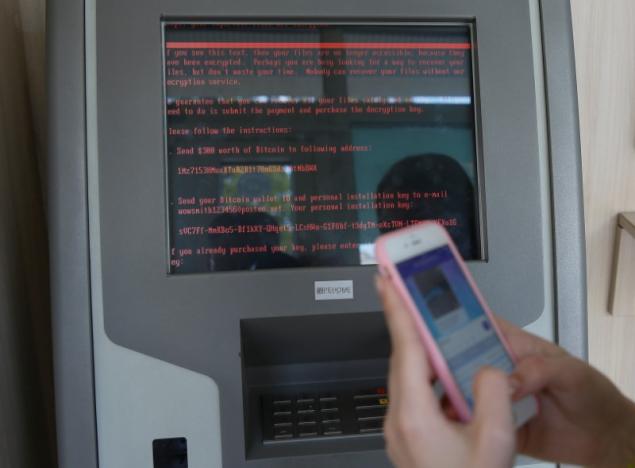
MOSCOW/KIEV/WASHINGTON — A major global cyberattack on Tuesday disrupted computers at Russia’s biggest oil company, Ukrainian banks and multinational firms with a virus similar to the ransomware that last month infected more than 300,000 computers.
The rapidly spreading cyber extortion campaign underscored growing concerns that businesses have failed to secure their networks from increasingly aggressive hackers, who have shown they are capable of shutting down critical infrastructure and crippling corporate and government networks.
It included code known as “Eternal Blue,” which cyber security experts widely believe was stolen from the U.S. National Security Agency and was also used in last month’s ransomware attack, named “WannaCry.”
“Cyberattacks can simply destroy us,” said Kevin Johnson, chief executive of cyber security firm Secure Ideas. “Companies are just not doing what they are supposed to do to fix the problem.”
The ransomware virus crippled computers running Microsoft Corp’s Windows by encrypting hard drives and overwriting files, then demanded $300 in bitcoin payments to restore access. More than 30 victims paid into the bitcoin account associated with the attack, according to a public ledger of transactions listed on blockchain.info.
Microsoft said the virus could spread through a flaw that was patched in a security update in March.
“We are continuing to investigate and will take appropriate action to protect customers,” a spokesman for the company said, adding that Microsoft antivirus software detects and removes it.
Russia and Ukraine were most affected by the thousands of attacks, according to security software maker Kaspersky Lab, with other victims spread across countries including Britain, France, Germany, Italy, Poland and the United States. The total number of attacks was unknown.
Security experts said they expected the impact to be smaller than WannaCry since many computers had been patched with Windows updates in the wake of WannaCry last month to protect them against attacks using Eternal Blue code.
Still, the attack could be more dangerous than traditional strains of ransomware because it makes computers unresponsive and unable to reboot, Juniper Networks said in a blog post analyzing the attack.
Researchers said the attack may have borrowed malware code used in earlier ransomware campaigns known as “Petya” and “GoldenEye.”
Following last month’s attack, governments, security firms and industrial groups aggressively advised businesses and consumers to make sure all their computers were updated with Microsoft patches to defend against the threat.
The U.S. Department of Homeland Security said it was monitoring the attacks and coordinating with other countries. It advised victims not to pay the extortion, saying that doing so does not guarantee access will be restored.
In a statement, the White House National Security Council said there was currently no risk to public safety. The United States was investigating the attack and determined to hold those responsible accountable, it said.
The NSA did not respond to a request for comment. The spy agency has not publicly said whether it built Eternal Blue and other hacking tools leaked online by an entity known as Shadow Brokers.
Several private security experts have said they believe Shadow Brokers is tied to the Russian government, and that the North Korean government was behind WannaCry. Both countries’ governments deny charges they are involved in hacking.
WATCH THE REUTERS TV REPORT:
The first attacks were reported from Russia and Ukraine.
Russia’s Rosneft, one of the world’s biggest crude producers by volume, said its systems had suffered “serious consequences,” but added oil production had not been affected because it switched over to backup systems.
Ukrainian Deputy Prime Minister Pavlo Rozenko said the government’s computer network went down and the central bank reported disruption to operations at banks and firms including the state power distributor.
Danish shipping giant A.P. Moller-Maersk said it was among the victims, reporting outages at facilities including its Los Angeles terminal.
WPP, the world’s largest advertising agency, said it was also infected. A WPP employee who asked not to be named said that workers were told to shut down their computers: “The building has come to a standstill.”
A Ukrainian media company said its computers were blocked and it was asked to pay $300 in the crypto-currency bitcoin to regain access.
“Perhaps you are busy looking for a way to recover your files, but don’t waste your time. Nobody can recover your files without our decryption service,” the message said, according to a screenshot posted on Ukraine’s Channel 24.
Russia’s central bank said there were isolated cases of lenders’ IT systems being infected. One consumer lender, Home Credit, had to suspend client operations.
Other companies that identified themselves as victims included French construction materials firm Saint Gobain, U.S. drugmaker Merck & Co. and Mars Inc.’s Royal Canin pet food business.
India-based employees at Beiersdorf, makers of Nivea skin care products, and Reckitt Benckiser, which owns Enfamil and Lysol, told Reuters the ransomware attack had impacted some of their systems in the country.
Western Pennsylvania’s Heritage Valley Health System’s entire network was shut down by a cyber attack on Tuesday, according to local media reports.
Last’s month’s fast-spreading WannaCry ransomware attack was crippled after a 22-year-old British security researcher Marcus Hutchins created a so-called “kill switch” that experts hailed as the decisive step in slowing the attack.
Security experts said they did not believe that the ransomware released on Tuesday had a kill switch, meaning that it might be harder to stop.
Ukraine’s cyber police said on Twitter that a vulnerability in software used by MEDoc, a Ukrainian accounting firm, may have been an initial source of the virus, which researchers including cyber intelligence firm Flashpoint said could have infected victims via an illegitimate software update.
In a Facebook post, MEDoc confirmed it had been hacked but denied responsibility for originating the attack.
An adviser to Ukraine’s interior minister said earlier in the day that the virus got into computer systems via “phishing” emails written in Russian and Ukrainian designed to lure employees into opening them.
According to the state security agency, the emails contained infected Word documents or PDF files as attachments.
Following is a list of companies and organizations that have reported being hit by cyberattacks:
ROSNEFT
Russia’s top oil producer Rosneft said its servers had been hit been a large-scale cyberattack but its oil production was unaffected.
A.P. MOLLER-MAERSK
Danish shipping giant A.P. Moller-Maersk, which handles one out of seven containers shipped globally, said a cyberattack had caused outages at its computer systems across the world.
Maersk’s port operator APM Terminals was also hit. Dutch broadcaster RTV Rijnmond reported that 17 shipping container terminals run by APM Terminals had been hacked, including two in Rotterdam and 15 in other parts of the world.
WPP
Britain’s WPP, the world’s biggest advertising company, said computer systems within several of its agencies had been hit by a suspected cyberattack.
MERCK & CO
Pharmaceutical company Merck & Co. said in a tweet its computer network was compromised as part of a global hack.
RUSSIAN BANKS
Russia’s central bank said there had been “computer attacks” on Russian banks and that in isolated cases their IT systems had been infected.
All Russian branches of Home Credit consumer lender are closed because of a cyberattack, an employee of a Home Credit call center in Russia said.
UKRAINIAN BANKS, POWER GRID
A number of Ukrainian banks and companies, including the state power distributor, were hit by a cyberattack that disrupted some operations, the Ukrainian central bank said.
UKRAINIAN INTERNATIONAL AIRPORT
Yevhen Dykhne, director of the capital’s Boryspil Airport, said it had been hit. “In connection with the irregular situation, some flight delays are possible,” Dykhne said in a post on Facebook.
SAINT GOBAIN
French construction materials company Saint Gobain said it had been a victim of a cyberattack, and it had isolated its computer systems to protect data.
DEUTSCHE POST
German postal and logistics company Deutsche Post said systems of its Express division in the Ukraine have in part been affected by a cyberattack.
METRO
Germany’s Metro said its wholesale stores in the Ukraine had been hit by a cyberattack and the retailer was assessing the impact.
MONDELEZ INTERNATIONAL
Food company Mondelez International said employees in different regions were experiencing technical problems but it was unclear whether this was due to a cyberattack.
TNT EXPRESS
The Netherlands-based shipping company said it was experiencing interference with some of its systems, following a global ransomware attack.
EVRAZ
Russian steelmaker Evraz said its information systems had been hit by a cyberattack but its output was not affected.
NORWAY
A ransomware cyberattack is taking place in Norway and is affecting an unnamed international company, the Nordic country’s national security authority.
MARS INC
A unit of candy manufacturer Mars Inc. has been targeted by cyber attackers, and the company has isolated the issue, a spokeswoman for the company said.
BEIERSDORF AG
India-based employees at Beiersdorf AG, the maker of Nivea skincare products, told Reuters the ransomware attack had impacted some of the company’s systems in the country. The extent of the impact was unclear and Beiersdorf, which is based in Germany, could not be reached immediately for comment in India.
RECKITT BENCKISER
The Indian unit of British consumer goods company Reckitt Benckiser Group Plc, which owns brands such as Enfamil, Dettol and Lysol, was also hit by the ransomware attack, employees in India told Reuters. The extent of the impact on its systems was not immediately clear and the company could not be reached for comment in India.









